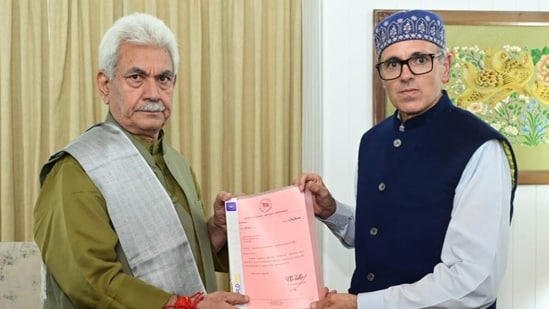Omar Abdullah, the former Chief Minister of Jammu and Kashmir and the Vice President of the National Conference (NC), has staked his claim for government formation in the union territory. This assertion comes at a time when political dynamics in Jammu and Kashmir are evolving rapidly, especially after recent elections and shifts in regional political alliances. Abdullah’s move signals a potential revival of the National Conference’s political fortunes and raises questions about the future governance of the region.
The Political Landscape in Jammu and Kashmir
Since the abrogation of Article 370 in August 2019, Jammu and Kashmir has undergone a major political transformation. The move by the Indian government to revoke the special status of the region has been met with mixed reactions from various political parties and the public. The National Conference, a prominent political entity in Jammu and Kashmir, has been vocal in its opposition to the central government’s decision. Omar Abdullah, who served as Chief Minister from 2009 to 2015, has been a central figure in advocating for the restoration of the region’s special status and greater autonomy.
The political environment has been characterized by a power vacuum since the last assembly elections in 2015, as the region has been under President’s Rule for a considerable time. However, recent electoral successes for the National Conference and the People’s Democratic Party (PDP) in local body elections have reignited hopes for a stable government formation. With these developments, Abdullah’s claim for government formation is viewed as an attempt to capitalize on the changing political landscape and restore the party’s influence in the region.
Abdullah’s Vision for Jammu and Kashmir
In his statement regarding the claim for government formation, Omar Abdullah emphasized the need for a stable and representative government that addresses the concerns of the people of Jammu and Kashmir. He asserted that the region requires a government that can prioritize economic development, security, and the restoration of peace. Abdullah stated, “The people of Jammu and Kashmir deserve a government that listens to their concerns and works tirelessly to improve their lives. We must rebuild the trust that has been lost in the political process.”
Abdullah’s vision encompasses a focus on youth employment, infrastructure development, and improved relations between different communities in the region. His call for government formation is aimed at uniting various factions and addressing the grievances that have arisen in the aftermath of the central government’s decisions.
Challenges Ahead
Despite Abdullah’s bold move, the road to government formation is fraught with challenges. One of the primary obstacles is the complex political landscape in Jammu and Kashmir, where multiple parties and alliances compete for influence. The National Conference, while historically significant, must contend with the rising popularity of other regional parties, particularly the PDP, led by Mehbooba Mufti.
Moreover, the Bharatiya Janata Party (BJP), which has a strong foothold in the region, poses a formidable challenge. The BJP has consistently advocated for a more integrated approach to governance in Jammu and Kashmir, opposing any demands for autonomy. Abdullah’s government formation claim must navigate this challenging terrain and find ways to build alliances that can secure a majority.
The lingering effects of the abrogation of Article 370 also create hurdles. Many residents remain skeptical of the central government’s intentions, and Abdullah will need to address these concerns if he hopes to garner widespread support for his leadership.
A Call for Unity and Cooperation
In his recent statements, Abdullah has called for unity among various political factions in Jammu and Kashmir. He believes that a collaborative approach is essential for effective governance and addressing the pressing issues facing the region. His emphasis on dialogue and cooperation reflects a broader sentiment among political leaders who recognize the importance of inclusivity in the region’s political discourse.
Abdullah’s call for a coalition government could potentially resonate with other regional parties that share similar concerns about governance, autonomy, and representation. If he can successfully forge alliances, there is a possibility of creating a government that reflects the diverse voices of Jammu and Kashmir’s population
Omar Abdullah’s claim for government formation in Jammu and Kashmir marks a crucial moment in the region’s political landscape. As the National Conference seeks to regain its footing after years of political upheaval, Abdullah’s leadership will be tested in navigating a complex array of challenges and opportunities. The success of his bid for governance will depend on his ability to unite various factions, address the concerns of the populace, and restore faith in the political process.
As Jammu and Kashmir continues to navigate its post-abrogation era, the potential for a stable and representative government remains a key concern for the people. Abdullah’s vision for the future of the region could shape the political narrative in the coming months, influencing not only the National Conference’s fortunes but also the broader trajectory of governance in Jammu and Kashmir.

